編輯點(diǎn)評(píng):2020年9月英語(yǔ)四級(jí)真題答案解析和聽力視頻
全國(guó)英語(yǔ)四級(jí)考試CET時(shí)間是越來(lái)越近了,估計(jì)很多同學(xué)都在找歷年的真題試卷來(lái)學(xué)習(xí),小編這里特意整理了2020年9月英語(yǔ)四級(jí)真題電子版一套,二套和三套,還附上了真題答案和解析,pdf的格式,并附上了聽力音頻原文需要的可以自己免費(fèi)下載。

2020年9月英語(yǔ)四級(jí)真題電子版共三套預(yù)覽
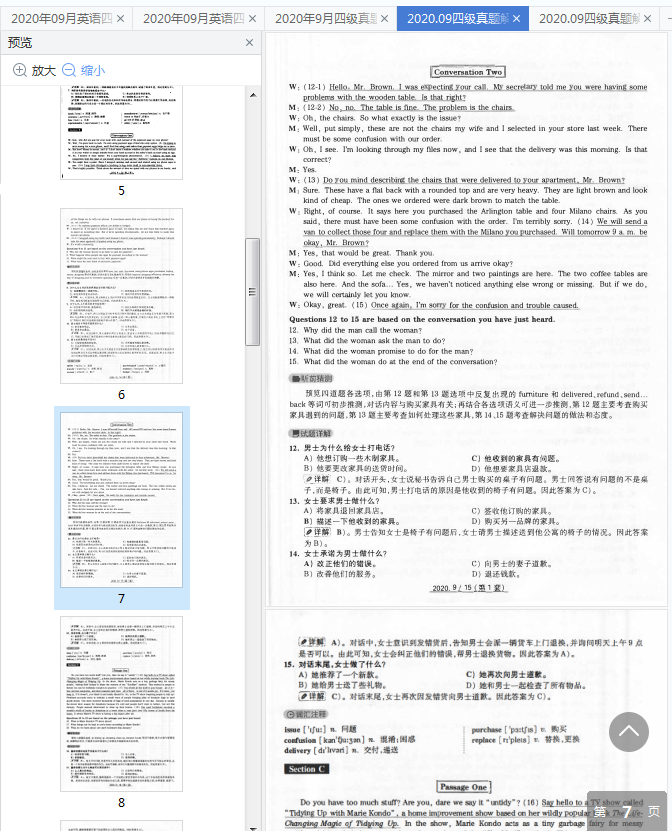
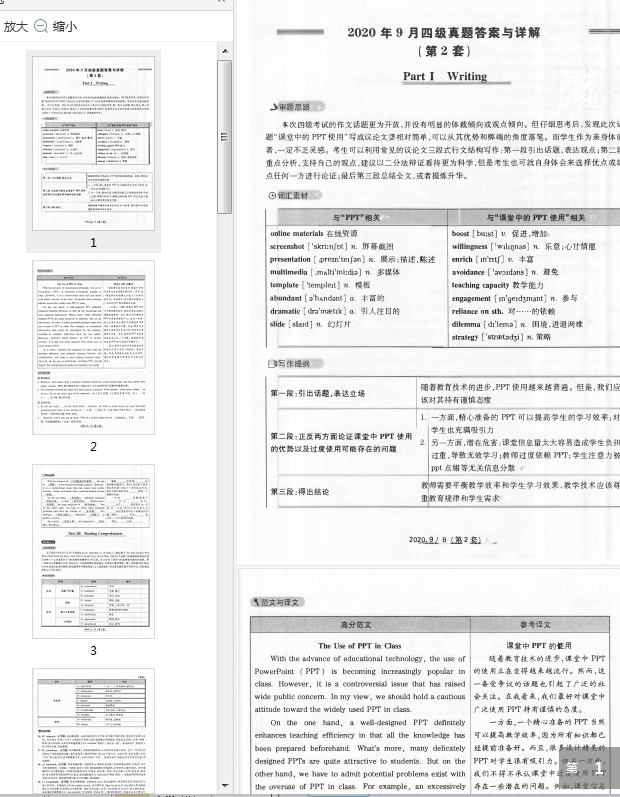
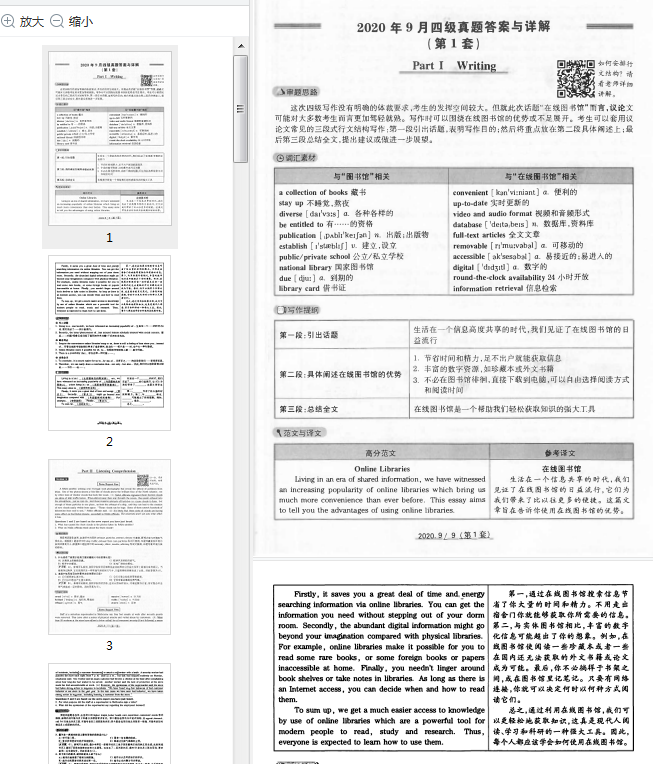

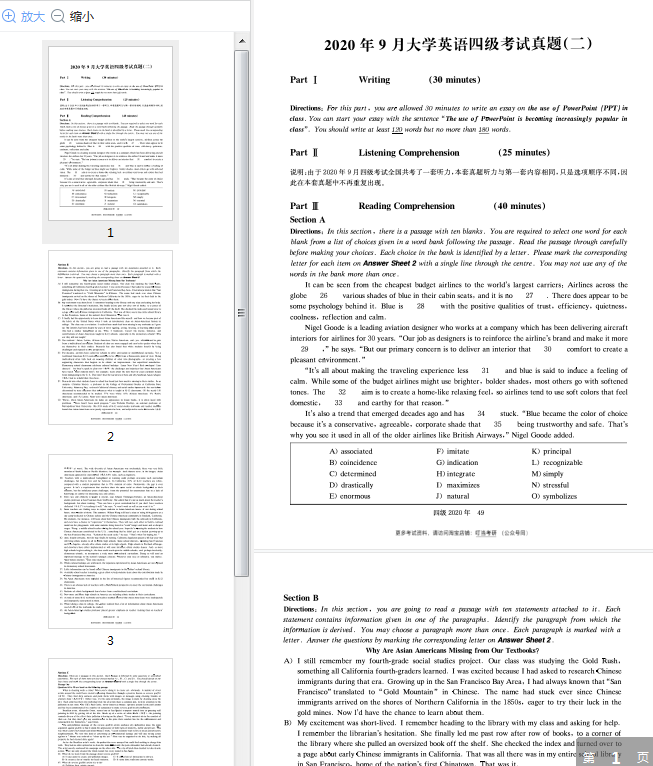
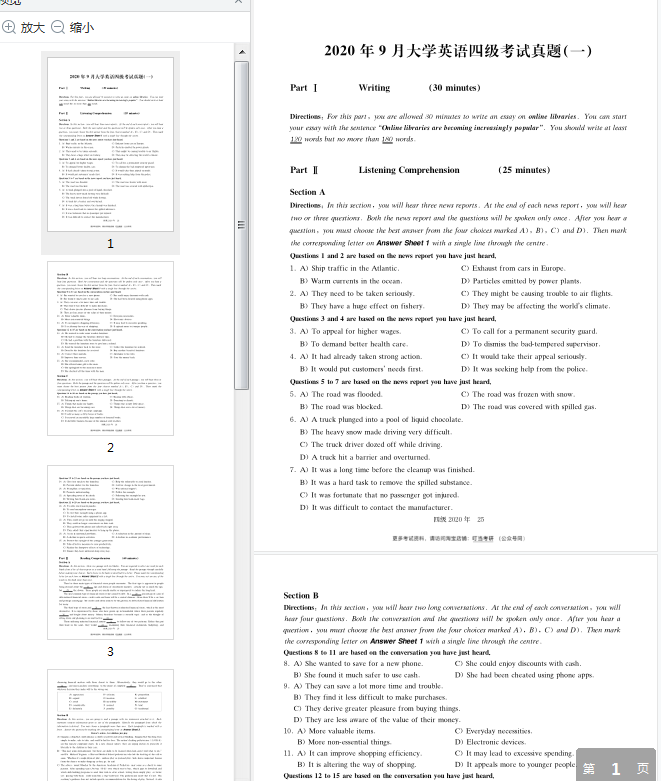
內(nèi)容介紹
2020年9月大學(xué)英語(yǔ)四級(jí)考試真題(一).pdf
2020年9月大學(xué)英語(yǔ)四級(jí)考試真題(二).pdf
2020年9月大學(xué)英語(yǔ)四級(jí)考試真題(三).pdf
2020年9月四級(jí)真題答案與詳解(第1套).pdf
2020年9月四級(jí)真題答案與詳解(第2套).pdf
2020年9月大學(xué)英語(yǔ)四級(jí)聽力原文.m4a
2020年9月英語(yǔ)四級(jí)真題試卷內(nèi)容預(yù)覽
Section B Directions: In this section, vou will heur two long conversations. At the end of cach conversation, vou will hear four questions. Both the conversation and the questions will be spoken only owce. After yow hear a question, you must chose the best answer from the four choices marked A). B). C) and D). Then mark the correspowding letter on Answer Sheet 1 with a sinele line throueh the centre.
Questions 8 to 1l are hased on the conversation you have just heard.
8. A) She wanted to save for a new phone.
C) She could enjoy discounts with cash.B) She found it much safer to use cash.
D) She had been chcated using phone apps
9. A) They can save a lot more time and trouble B) They find it Iess difficult to make purchases.
C) They derive greater pleasure from buying things.D) Thev are less aware of the value of their monev.
10. A) More valuable items.
C) Everyday necessities.
B) More non-essential things.
D) Electronic devices.
11. A) It can improve shopping efficiency C) It may lead to excessive spending B) It is altering the way of shopping.
D) It appeals more to younger pcople.
Ouestions 12 to 15 are hased on the conversation you have just heard
12. A) He wanted to order some wooden furniture.
B) He had to change the furniture delivery time C) He had a problem with the furniture delivered.
D) He wanted the furniture store to give him a refund
13. A) Send the furniture back to the store.
C) Collect the furniture he ordered B) Describe the furniture he received D) Buy another brand of furniture.
14. A) Correct their mistake.
C) Apologize to his wife.
B) Improve their service D) Give the money back.
15. A) She recommended a new style.
B) She offered some gift to the man.
C) She apologized to the man once more D) She checked all the items with the man.
Section C Directions: In this section, voe will Aeur three prsgages. Ar the end of cach pxssage. ou will htear ihree on four questions. Both the prssage and the questions will be spoken only once. After you hear a question, vou must choose the best answer from the four choices marked A), B). C) and D). Then mark the corresponding lerter on Answer Sheet 1 wirh a single line through the centre.
Questions 16 to 18 are based on the passage you have just heard,
16. A) Reading books of wisdom.
C) Sharing with others.
B) Tidying up one's home D) Donating to charity
17. A) Things that make one happy.
C) Things that occupy little space.
B) Things that are becoming rare.
D) Things that cost a lot of money.
18. A) It joined the city's clcan-up campaign.
B) It sold as many as fifty boxes of books.
C) It received an incredibly large number of donated books D) It did little business because of the unusual cold weather
英語(yǔ)四級(jí)考試注意事項(xiàng)及流程
1英語(yǔ)四級(jí)考試流程
8:40——9:00試音時(shí)間
9:00——9:10閱讀考場(chǎng)注意事項(xiàng),發(fā)放考卷,貼條形碼
9:10——9:40作文考試階段
9:40——10:05聽力測(cè)試
10:05——10:10考試暫停5分鐘,收答題卡1(即作文和聽力)聽力結(jié)束后完成剩余考項(xiàng):閱讀和翻譯
11:20全部考試結(jié)束。
2英語(yǔ)四級(jí)考試注意事項(xiàng)
1、考生必須按規(guī)定的時(shí)間(上午8:40)入場(chǎng),入場(chǎng)開始15分鐘(即上午9:00)后,禁止入場(chǎng)。入場(chǎng)時(shí)必須主動(dòng)出示準(zhǔn)考證、學(xué)生證以及有效身份證件,接受考試工作人員核驗(yàn),并按要求在考場(chǎng)簽到冊(cè)上簽名。未按規(guī)定攜帶有效證件的一律不得入場(chǎng)考試。在考試結(jié)束前禁止提前退場(chǎng)。
2、所有考生禁止攜帶手機(jī)等通訊設(shè)備或有存儲(chǔ)功能的電子設(shè)備進(jìn)入考場(chǎng)。違者一律取消考試資格或以作弊論處。在非聽力考試期間,禁止考生佩戴耳機(jī)答題,否則按違規(guī)處理。考試結(jié)束后,所有材料嚴(yán)禁帶出考場(chǎng),考生需等監(jiān)考教師收齊并清點(diǎn)無(wú)誤后,方可離場(chǎng)。
3、考生必須嚴(yán)格遵守考試紀(jì)律,獨(dú)立完成考試內(nèi)容,嚴(yán)禁冒名頂替、夾帶、抄襲等任何作弊行為,如發(fā)現(xiàn)有作弊行為者,將按照《國(guó)家教育考試違規(guī)處理辦法》給予相應(yīng)的處分。
3英語(yǔ)四級(jí)考試技巧
聽力
放音之前,預(yù)覽選項(xiàng);注意捕捉錄音第一句;注意but、and、however之類的關(guān)鍵詞。
閱讀
先看題干再看文章;注意文章重點(diǎn):轉(zhuǎn)折、比較、因果、獨(dú)立成段;帶著題干中的關(guān)鍵詞迅速回原文定位。
翻譯
能短就短,但要翻譯完整;動(dòng)詞突破,理清關(guān)系;重點(diǎn)把握名詞、動(dòng)詞、形容詞。
作文
注意參考例文,提取文章的萬(wàn)能句;考前多背模板;避免重復(fù)詞和重復(fù)句。
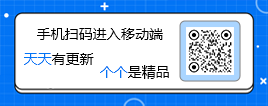

 黃岡歷年中考物理試卷及答案解析2007-2020年整合版
黃岡歷年中考物理試卷及答案解析2007-2020年整合版 黃岡市中考化學(xué)試卷2012-2020年整合版
黃岡市中考化學(xué)試卷2012-2020年整合版 黃岡中考英語(yǔ)試卷及答案2007-2020整合word版
黃岡中考英語(yǔ)試卷及答案2007-2020整合word版 黃岡數(shù)學(xué)中考試卷及答案2011-2020年整合版
黃岡數(shù)學(xué)中考試卷及答案2011-2020年整合版 計(jì)算機(jī)畢業(yè)設(shè)計(jì):ASP語(yǔ)言設(shè)計(jì)完整版
計(jì)算機(jī)畢業(yè)設(shè)計(jì):ASP語(yǔ)言設(shè)計(jì)完整版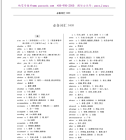 專插本英語(yǔ)詞匯必備3400pdf
專插本英語(yǔ)詞匯必備3400pdf 化妝品行業(yè)2021年投資策略報(bào)告pdf免費(fèi)版
化妝品行業(yè)2021年投資策略報(bào)告pdf免費(fèi)版 2020全國(guó)中考英語(yǔ)真題試卷及答案解析整合版
2020全國(guó)中考英語(yǔ)真題試卷及答案解析整合版 2020全國(guó)中考數(shù)學(xué)真題試卷及答案解析匯總大全
2020全國(guó)中考數(shù)學(xué)真題試卷及答案解析匯總大全 2020全國(guó)中考語(yǔ)文真題及解析匯總整合版免費(fèi)版
2020全國(guó)中考語(yǔ)文真題及解析匯總整合版免費(fèi)版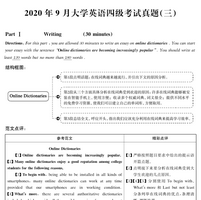



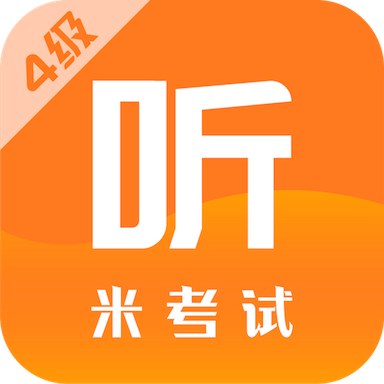

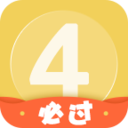


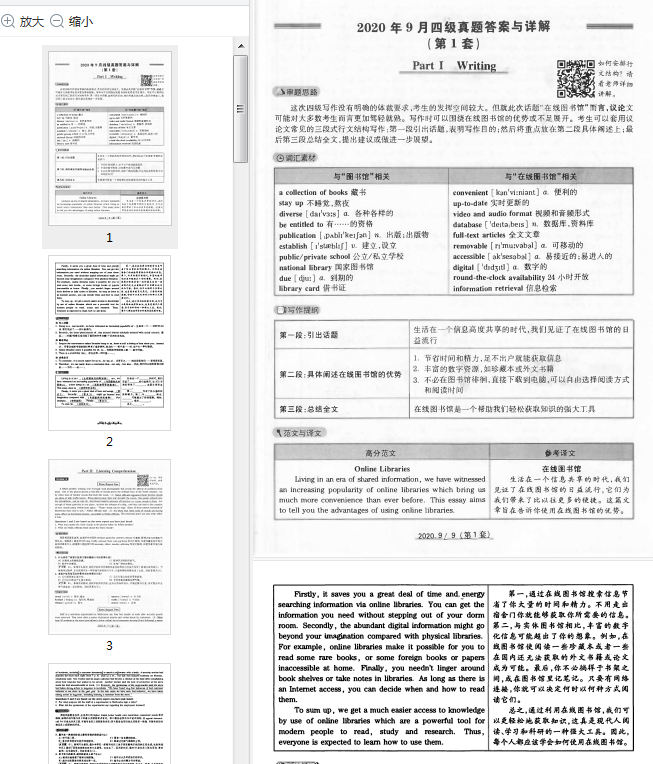
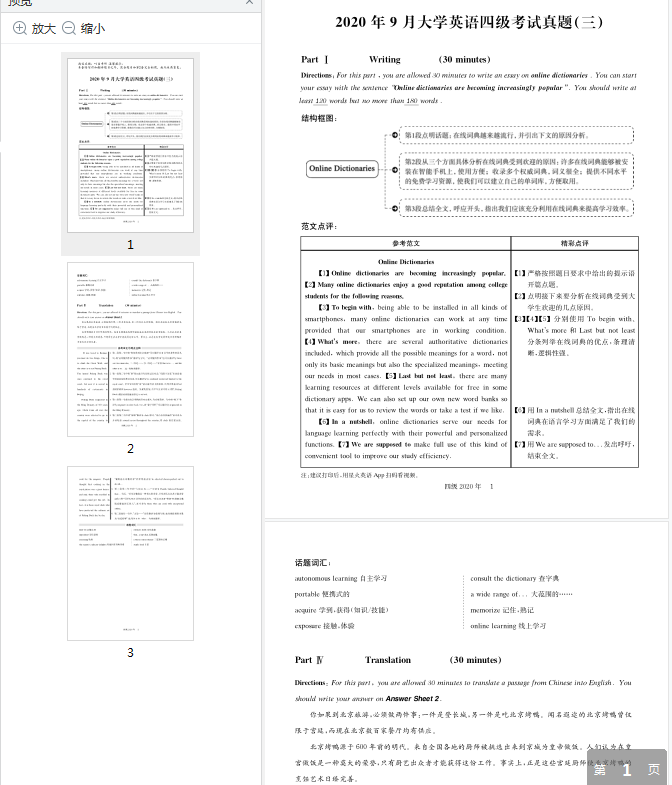
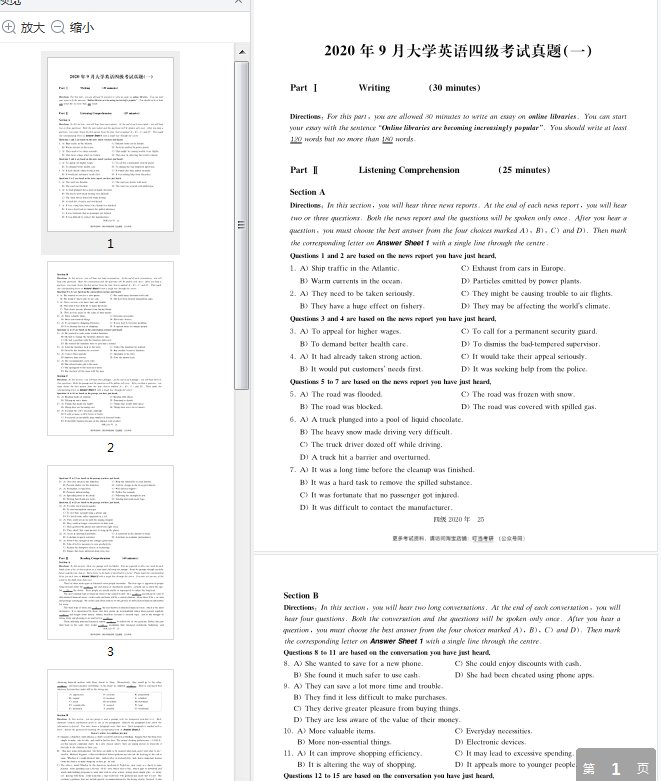
 黃岡歷年中考試題及答案解析2012-2020年語(yǔ)文試卷word無(wú)水印版
黃岡歷年中考試題及答案解析2012-2020年語(yǔ)文試卷word無(wú)水印版 2020全國(guó)中考物理真題及答案解析合集免費(fèi)版
2020全國(guó)中考物理真題及答案解析合集免費(fèi)版 數(shù)學(xué)物理方程講義完整版1-5講電子版pdf高清無(wú)水印版
數(shù)學(xué)物理方程講義完整版1-5講電子版pdf高清無(wú)水印版 2021各科中考總復(fù)習(xí)專題知識(shí)要點(diǎn)pdf整合版
2021各科中考總復(fù)習(xí)專題知識(shí)要點(diǎn)pdf整合版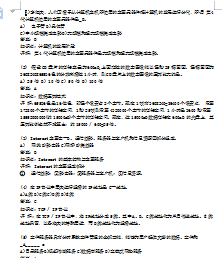 計(jì)算機(jī)三級(jí)網(wǎng)絡(luò)題庫(kù)及答案免費(fèi)分享完整版
計(jì)算機(jī)三級(jí)網(wǎng)絡(luò)題庫(kù)及答案免費(fèi)分享完整版 2021年新高考數(shù)學(xué)名校地市必刷題合集word版新高考專用版
2021年新高考數(shù)學(xué)名校地市必刷題合集word版新高考專用版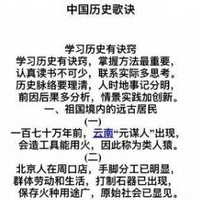 高考?xì)v史必背知識(shí)點(diǎn)歸納2021整理版完整版
高考?xì)v史必背知識(shí)點(diǎn)歸納2021整理版完整版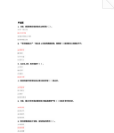 金融學(xué)網(wǎng)考試題及答案world版高清無(wú)水印
金融學(xué)網(wǎng)考試題及答案world版高清無(wú)水印 《學(xué)會(huì)寬容-善待他人》演講稿300字world版docx5篇完整版
《學(xué)會(huì)寬容-善待他人》演講稿300字world版docx5篇完整版 高考政治真題分項(xiàng)詳解16套專題pdf完整版
高考政治真題分項(xiàng)詳解16套專題pdf完整版 2021年高考英語(yǔ)一輪復(fù)習(xí)單元滾動(dòng)雙測(cè)卷人教版免費(fèi)版
2021年高考英語(yǔ)一輪復(fù)習(xí)單元滾動(dòng)雙測(cè)卷人教版免費(fèi)版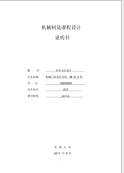 機(jī)械制造工藝設(shè)計(jì)杠桿(一)docx+pdf免費(fèi)下載完整版
機(jī)械制造工藝設(shè)計(jì)杠桿(一)docx+pdf免費(fèi)下載完整版 大小: 110.2M
大小: 110.2M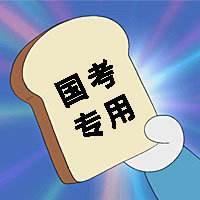
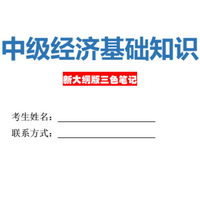
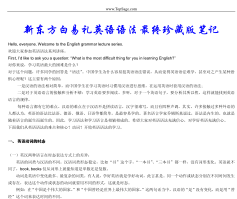






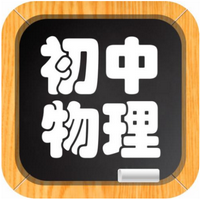

 中考復(fù)習(xí)資料大全
中考復(fù)習(xí)資料大全 新高考復(fù)習(xí)資料合集
新高考復(fù)習(xí)資料合集 三年級(jí)復(fù)習(xí)資料合集
三年級(jí)復(fù)習(xí)資料合集 二級(jí)建造師考試資料大全
二級(jí)建造師考試資料大全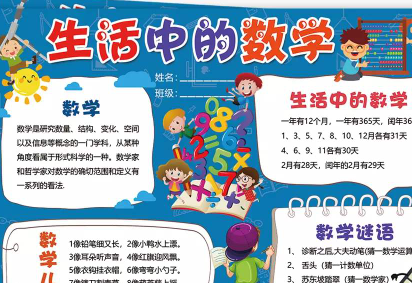 數(shù)學(xué)題庫(kù)文檔
數(shù)學(xué)題庫(kù)文檔 Conefor Sensinode 2.6用戶手冊(cè)(中文版)
Conefor Sensinode 2.6用戶手冊(cè)(中文版)
支持( 0 ) 蓋樓(回復(fù))